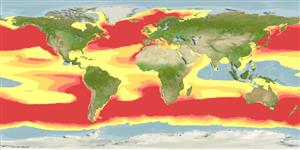>
Aulopiformes (Grinners) >
Paralepididae (Barracudinas)
Etymology: Arctozenus: Greek, arktos = bear + particle zen, derived from zao = to give life; risso: Named after A. Risso, European ichthyologist (Ref. 6885).
Eponymy: Professor Giovanni Antonio Risso (1777–1845) (aka Joseph Antoine Risso) was an Italian-French naturalist and the first to describe deep-sea fishes as distinctive fauna and describe depth zonation with different species living in discrete depth [...] (Ref. 128868), visit book page.
More on author: Bonaparte.
Issue
Genus and spelling of species Eschmeyer, pers. comm. and in Paxton et al. 1989 (Ref.7300:247).
Environment: milieu / climate zone / depth range / distribution range
Ekologi
marina batypelagisk; djupintervall 0 - 2200 m (Ref. 50610). Deep-water; 71°N - 55°S, 180°W - 180°E
Worldwide distribution from the Arctic to Antarctic. Eastern Pacific: British Columbia (55°N) to at least north central Baja California (28°N) (Ref. 35950). Northwest Pacific: Bering Sea, Kamchatka, Kuril Islands (Ref. 41668).
Size / Vikt / Age
Maturity: Lm ? range ? - ? cm
Max length : 30.0 cm SL hane/ej könsbestämd; (Ref. 35388); common length : 25.0 cm SL hane/ej könsbestämd; (Ref. 4473)
Taggstrålar i ryggfenan (totalt) : 0; Mjukstrålar i ryggfenan (totalt) : 8 - 13; Taggstrålar i analfenan: 0; Mjukstrålar i analfenan: 28 - 34; Ryggkotor: 72 - 86. Bright silvery in color (Ref. 6885). Branchiostegal rays: 8 (Ref. 35950).
Pseudoceanic and mesopelagic, occurring singly or in small schools (Ref. 5759), primarily at 200-1000 (Ref. 58302). Feed mainly on fishes and shrimps (Ref. 5759). Spawn in continental slopes and in oceanic banks from northern through tropical to southern temperate waters. Oviparous, with planktonic larvae (Ref. 35950).
Life cycle and mating behavior
Könsmognad | Reproduktion | Lek | Ägg | Fecundity | Larver
Post, A., 1990. Paralepididae. p. 373-384. In J.C. Quero, J.C. Hureau, C. Karrer, A. Post and L. Saldanha (eds.) Check-list of the fishes of the eastern tropical Atlantic (CLOFETA). JNICT, Lisbon; SEI, Paris; and UNESCO, Paris. Vol. 1. (Ref. 4473)
IUCN Red List Status (Ref. 130435: Version 2024-1)
Threat to humans
Harmless
Human uses
Fiskeri: saknar intresse
Verktyg
Special reports
Download XML
Internet-källor
Estimates based on models
Preferred temperature (Ref.
123201): 0.8 - 10.8, mean 4.1 °C (based on 2120 cells).
Phylogenetic diversity index (Ref.
82804): PD
50 = 1.0000 [Uniqueness, from 0.5 = low to 2.0 = high].
Bayesian length-weight: a=0.00224 (0.00090 - 0.00555), b=3.14 (2.92 - 3.36), in cm total length, based on LWR estimates for this (Sub)family-body shape (Ref.
93245).
Trofisk nivå (Ref.
69278): 3.2 ±0.0 se; based on diet studies.
Resiliens (Ref.
120179): Mellan, lägsta populationsfördubblingstid 1,4-4,4 år (Preliminary K or Fecundity.).
Fishing Vulnerability (Ref.
59153): Low to moderate vulnerability (27 of 100).
Nutrients (Ref.
124155): Calcium = 49.9 [16.8, 160.1] mg/100g; Iron = 0.548 [0.182, 1.750] mg/100g; Protein = 15.6 [12.5, 18.2] %; Omega3 = 0.105 [0.029, 0.325] g/100g; Selenium = 27.5 [7.9, 78.4] μg/100g; VitaminA = 14.2 [1.6, 119.9] μg/100g; Zinc = 0.615 [0.321, 1.262] mg/100g (wet weight);
